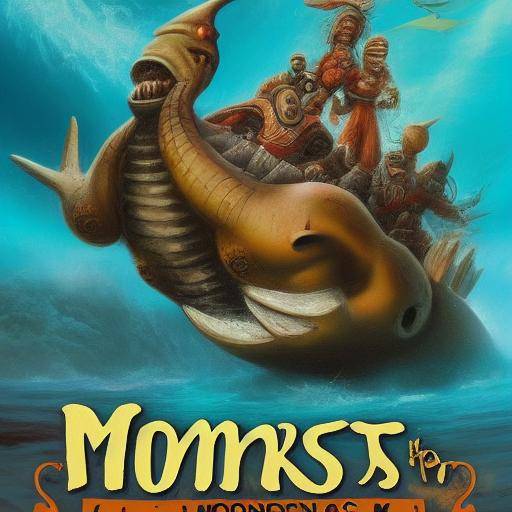
Introduction
The ocean, with its vast expanse and hidden mysteries, has been home to countless myths and legends that have intrigued humanity since time immemorial. In this article, we will venture into the depths of marine folklore to discover the fascinating stories of sea monsters, sea legends and aquatic folklore that have captured the imagination of sailors, fishermen and sea lovers throughout history. We will explore its origins, cultural implications, and its relevance in today's society. Get ready to dive into an exciting journey through the mysterious waters of the ocean!
History and Background
The origins of the stories about sea monsters go back to ancient civilizations, where the imposing and unknown nature of the ocean inspired a rich tradition of myths and legends. From Leviathan in Hebrew mythology to the Kraken of Scandinavian mythology, these creatures have been representative of the fears and wonders that the sea evokes in human imagination. Over time, these stories have evolved, adapting to the experiences and beliefs of various maritime cultures, becoming a fundamental element of aquatic folklore around the world.
Throughout history, the legends of the sea have played a crucial role in maritime culture, serving as symbolic warnings, mythical explanations of natural phenomena and as sources of inspiration for art, literature and cinema. These stories have penetrated into collective consciousness, influencing the perception we have of the ocean and its life.
More Deep Analysis
The impressive narratives of sea monsters, sea legends and aquatic folklore have not only entertained generations, but have also played a significant role in popular beliefs and maritime customs. The influence of these stories has transcended the geographical barriers, encouraging explorers and scientists to discover the truth behind the legendary stories. Through modern research, it has been possible to shed light on natural phenomena previously associated with these myths, revealing the fascinating intersection between fantasy and reality in the vast marine kingdom.
Aquatic folklore, which encompasses a diverse range of mythological creatures and beliefs, has endured over time and continues to enrich our understanding of the relationship between man and the sea. These stories offer us a window into the past, allowing us to explore how ancient civilizations interpreted and gave meaning to natural phenomena, as well as the mysteries of the ocean.
Comprehensive review
The comparative study of these stories reveals to us the similarities and differences that exist between different maritime cultures, offering us an enriching view of the diversity of aquatic folklore. As we enter this deeper exploration, we recognize the importance of preserving and transmitting these stories, so that they continue to inspire astonishment and admiration for the immensity and complexity of the ocean.
Conclusion
As we end this journey through the legends of depths, it is impossible not to be amazed by the immense influence and relevance that sea monsters, legends of the sea and aquatic folklore have had in humanity throughout history. These stories remind us of the ability of the ocean to inspire imagination and wonder, as well as the importance of preserving our rich heritage of marine myths and legends for future generations.
In short, the depths of the ocean enclose treasures of narratives as fascinating and varied.
Frequently asked questions
What are some of the most famous sea monsters in mythology?
Marine monsters have been an integral part of numerous mythologies around the world. Some of the most famous include the Kraken of Nordic mythology, Leviathan in Hebrew tradition, and the Cthulhu of H.P. Lovecraft's stories.
How do the legends of the sea impact on contemporary culture?
The legends of the sea continue to impact contemporary culture through its presence in literature, cinema, art and music. They are an inexhaustible source of inspiration and continue to fascinate audiences of all ages.
Are there scientific evidence of the existence of sea monsters?
While mythological descriptions of sea monsters have been discarded as pure fictions, science has discovered unknown marine species that, in the eyes of former sailors, could have been interpreted as monsters.
Why have the stories of aquatic folklore persisted throughout the centuries?
The stories of aquatic folklore have endured because of their ability to connect with the nature and mysteries of the sea, as well as their role in the transmission of ancestral knowledge and the creation of a cultural identity.
How have the legends of the sea influenced the exploration and discovery of the ocean?
The legends of the sea have fed curiosity for the wonders hidden in the seas, encouraging explorers and scientists to discover the truth behind these narratives. Thus, they have contributed to the expansion of our knowledge about the ocean.
How has aquatic folklore influenced contemporary literature and cinema?
Aquatic folklore has been a recurring source of inspiration for writers and filmmakers, permeating contemporary fiction with elements of these stories, which has enriched the narrative of the sea in popular culture.
In short, the legends of the sea and aquatic folklore continue to fascinate humanity with its mystery and its ability to evoke wonder, inspiring both artists and scientists to enter the depths of our marine narratives.
